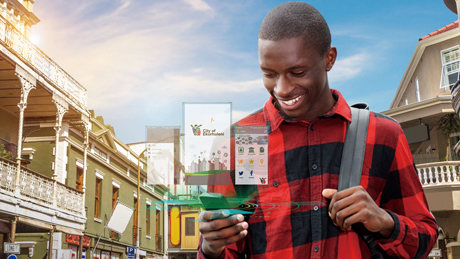Huawei Helps the City of Ekurhuleni Grow into a South African Smart City Pioneer

The City of Ekurhuleni (COE) is an important industrial center in Gauteng, which is South Africa’s most economically developed province. With an area of 1,975 km2 and, according to Stats SA (the national statistical service of South Africa) a 2016 population of 3.37 million people, Ekurhuleni is the country’s fourth-largest metropolitan area, behind Cape Town, Johannesburg, and eThekwini. Ekurhuleni is a modern, highly urbanized city, which has served to usher in advanced medical facilities and high levels of education. To achieve and maintain this concentration of technological advancement, COE needed to further transform its health, education, transportation, and security sectors, as well as upgrade basic services such as electricity, water, public health, and emergency medical care.
“Ekurhuleni is a vibrant and innovative city in South Africa,” said Tumelo Kganane, Chief Information Officer for the city. “It is one of the largest air transportation, rail, and data hubs in South Africa. We have unique advantages in terms of technology, talent, and economy so we can build a Smart City, improve public satisfaction, and help enterprises grow. Smart City construction is a comprehensive project. We need to select the best partner to achieve success.”
Huawei Horizon Digital Platform supports cloud data center solutions and converged communications solutions. Few other industry vendors can match the capabilities and products offered by Huawei. Huawei solutions are also compatible with third party developers that help customers participate in the prosperous global market of Smart City ecosystems. To date, Huawei Horizon Digital Platform has been deployed in more than 200 cities across over 40 countries. In view of these advantages, Ekurhuleni selected Huawei to help it become a Smart City.
After studying the complexities at play in Ekurhuleni, Huawei helped the city design customized Smart City strategies, covering ‘connected city,’ ‘efficient city,’ and ‘smart city.’ Ekurhuleni planned to build a safe, green, clean, healthy, and intelligent city based on an understanding of the 30 elements that constitute a municipality.
At the same time, 11 IT strategies were developed:
• Deliver business solutions
• Optimize IT management and governance
• Improve IT organization and employee capabilities
• Reduce IT costs
• Integrate IT operation and resources
• Expand the scope of informatisation and data analysis
• Deploy mobile solutions
• Simplify business processes
• Integrate main businesses
• Improve the relationship between business departments
• Facilitate infrastructure development or management
In terms of strategy implementation, everything began with connectivity.
First, the City of Ekurhuleni built fiber broadband infrastructure to provide broadband access for third parties and enable data center network access to boost the economic development of local enterprises. The customer deployed a 1,400 km fiber network infrastructure that reduced production costs by 75 percent.
Second, Huawei enabled wireless broadband connectivity to provide free, public Wi-Fi. Government office buildings, municipal clinics, and libraries were the first to be covered, and were soon followed with the addition of commercial and residential areas.
Third, Huawei deployed a video conferencing solution to support Ekurhuleni’s 27 departments and public utilities, including access to remote branch offices. In the past, when city staff would travel through heavy traffic for frequent inter- and intra-departmental meetings, the journey to the meeting could last longer than the meeting itself. Today, with a new videoconferencing system deployed in all important buildings, efficient communications among government departments and public utilities is assured. The high quality, easy-to-use videoconferencing solution has improved office efficiency by saving time and reducing costs. In addition, the videoconferencing solution integrates with office systems and business systems to better support the city’s customer service business.
Historically, government departments have been slow to resolve problems that affected citizens and local enterprises. Coordination between departments has been irregular and often difficult because department data has been isolated in separate data centers. Ekurhuleni chose to build a secure, stable, and open cloud data center that could integrate diverse government applications, thereby improving government efficiency.
With more than 30 core applications and database business systems in operation, COE required the following:
• Zero data loss due to municipal system failures.
• Automatic fault detection and switchover for virtual machine and database services.
• Low capital investment, and quick system and service rollout.
Through comprehensive innovation in chips, hardware, and software, Huawei is able to provide customers with the most complete cloud data center solutions in the industry. The Ekurhuleni solution is an end-to-end active-active data center with business migration, continuity, and disaster recovery resources that are based on server, storage, and switching products. The solution achieved the following:
• Enabled intra-city active-active capability for core systems and remote application-level Disaster Recovery (DR) for applications to ensure zero data loss and service downtime.
• Improved the virtualization rate to 90 percent to boost operational efficiency and reduce power consumption.
• Provided automatic switchover and visualized DR to reduce Operations and Maintenance (O&M) costs and improve management efficiency by 65 percent.
The upgraded data centers ensured stable operation of Ekurhuleni’s diverse smart government applications. One of those applications is the ‘My Ekurhuleni’ app to provide mobile access to a majority of local government services.
“Through cooperation with Huawei, Ekurhuleni has deployed city-wide wired and wireless networks, powerful cloud data centers, and government applications. These are the cornerstones of a Smart City,” said Kganane. “We plan to build other IoT applications, such as Smart Transportation, Smart Buildings, Smart Meter Reading, and Smart Education. We will also build a command and control system based on unified communications to further improve city operation efficiency. We are determined to be a Smart City pioneer in South Africa by staying focused on good governance, people’s welfare, and economic revitalization.”